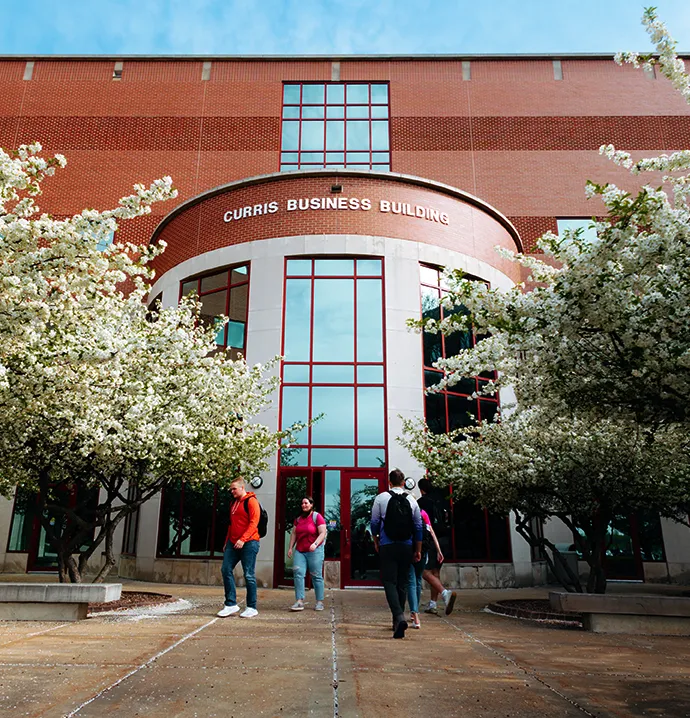'It’s not just learning to sell houses:' A look inside UNI's real estate program
'It’s not just learning to sell houses:' A look inside UNI's real estate program
It was 1976 and Arthur Cox was at his first day on the job as salesperson at a Quad Cities real estate firm. Excited to learn the ins and outs of his new position, he followed his boss to the open-office area where the company’s brokers spent a portion of their workdays. Rows of desks filled the space, and Cox’s then-boss pointed to an empty workstation and left Cox to do his job without any more introductions or training.
That world is long gone. Today, Cox is proud to lead a unique UNI program that prepares students for today’s much more complex real estate world, where property is a multi-trillion-dollar asset class. UNI offers Iowa’s only four-year real estate degree program, which has met a growing demand for highly educated real estate professionals.
As director of UNI’s Center for Real Estate Education, Cox brings his wealth of experience, to help students achieve real-world success. Having a strong education is even more important during uncertain times, like the current COVID-19 pandemic. In fact, according to Cox, a career in real estate offers opportunities even in difficult financial times.
“There were jobs all the way through the 2008 financial crisis,” said Cox. “There's always properties changing hands.”
Success is common for alumni of the program.
“A number of graduates are moving into leadership roles in their organization, or they own their own organization,” said Cox. “It’s very gratifying to see them being successful, both professionally and personally. They have a very, very good quality of life and that’s nice to see.”
First-hand experiences
Most people associate real estate with agents and brokers who sell houses to families, but an education in real estate is about much more than selling homes. The industry includes residential real estate, and the real estate agents we’re all familiar with, and commercial real estate, which deals more with investment properties for a variety of businesses. Both fields include a number of job opportunities, such as appraiser, loan servicer, property manager and mortgage lender.
“Real estate is not just brokerage, it’s not just getting a license and selling real estate. About 20% of our students do that, but about half our students go to work for banks and insurance companies,” said Cox. “The students get a much broader view of real estate as an asset class, so they see how it connects to other asset classes as an investment.”
Students gain this understanding through first-hand learning opportunities, like UNI’s real estate student club, Rho Epsilon, and internships with top companies, such as Wells Fargo, Aegon Real Assets and Principal Real Estate Investors. In fact, more often than not, students are exposed to real estate for the first time through internship opportunities. That’s what happened to UNI alumna Jessica Ballou ‘04.
When Ballou came to UNI, she didn’t know what she wanted to do. Her skills in math led her to UNIBusiness as a finance major, but an internship with Principal helped her discover a passion for real estate.
“This was the first time that I was given an opportunity that I really enjoyed. I enjoyed not only the job, but the people in the industry,” she said. “They have a passion for real estate and they're happy people. These are not people who get paid to just crunch numbers, these are people who enjoy what they do.”
Internship experiences help expose students to how fulfilling a career in real estate can be — and to the vast array of opportunities available within the industry. UNI junior Jared Larson interned on Principal’s commercial mortgage backed securities team during his sophomore year, and discovered that real estate incorporated a lot of what he loved about his finance major.
“My group was not strictly commercial real estate. It was a 50/50 mix between finance and real estate,” he said. “I was working full time for eight months. You get a real look when you’re there for that long. You really get to dig your teeth in and see if it’s an avenue you want to go down.”
He enjoyed the experience so much, he added a real estate major to his finance and economics majors. Taking on a triple major may seem like a challenge, but a lot of real estate and finance classes overlap, as do the skills required for the jobs.
“I think the finance classes kind of overflow into the real estate classes,” said Larson. “At the end of the day, when you're analyzing investments, whether it's finance or real estate, it's all the same kind of analysis. But getting all that knowledge definitely helps wrap everything all together.”
Finance and real estate are so related, it’s common to find students who double major in both. However, according to Cox, there are a number of other majors that commonly take on real estate as a minor.
“There's so much overlap between finance and real estate, it's almost a no brainer to double major in those. But there are also real-estate minors,” said Cox. “There are construction management majors, interior design majors, and a few marketing majors that get the real estate minor.”
The ‘you-will-not-fail’ program
The fact that such a diverse array of majors also study real estate speaks to how diverse the field is.
“There's lots of different things that you can do in real estate. That variety appeals to a lot of people,” said Cox. “Every building that exists, somebody had to visualize that building and then they had to create it, so there's a bunch of steps that happen along the way.”
This wide array of opportunities combined with high job placement is part of what appeals to students.
“It’s not just learning how to sell houses. There's more to it than that. There's a ton of opportunities available,” said Larson. “I get emails from Dr. Cox at least two or three times a week with him forwarding information from companies that are looking to hire interns or full time candidates.”
Having this sort of connection with professors is another thing students like about UNI’s program — and part of why real estate students are so successful. Ballou is now vice president for National Valuation Consultants, the largest privately held commercial real estate appraisal firm in the country, and she attributes her success to UNI.
“Looking where I'm at in my career compared to where I would have been if I had gone somewhere else, I can't be more thankful for my UNI education,” said Ballou. “Dr. Cox has done an amazing job of building the real estate department. He's created it so that there’s a network in place and that network really helps you after you graduate. You’ve got teachers that can help guide you, you've got the education, you've got the clubs and internships. It’s like the full-on, ‘you-will-not-fail’ program.”




